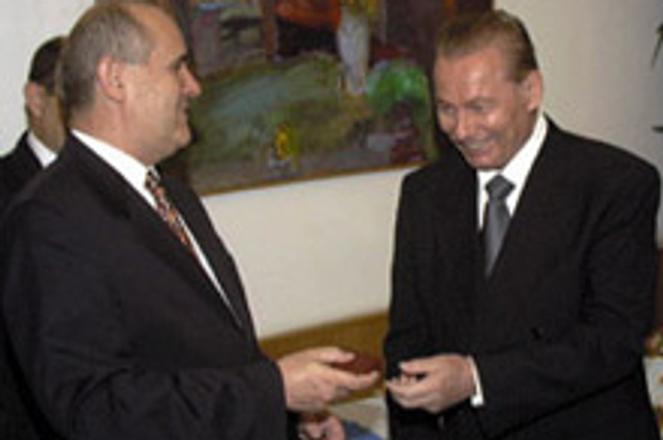Defence Minister Jozef Stank meeting President Rudolf Schuster during his time as a diplomat in Prague. His appointment was made official January 3.photo: TASR
After a difficult two weeks of coalition negotiations Slovakia averted a potential ly damaging conflict with NATO over the appoitment of a defence minister and installed the Slovak Ambassador to the Czech Republic, Jozef Stank, to the post January 3.
Originally educated as a technical sector manager, the 60 year-old diplomat was the last of three candidates of the reformed communist Party of Democratic Left (SDĽ), which under the coalition agreement has the exclusive right to nominate their candidate for the position.
His appointment came after the resignation of Pavol Kanis in December 16 - who stepped down after he failed to fully divulge the financing of the construction of a luxury villa in Bratislava - and the earlier candidacy of a former army general and SDĽ caucus leader, Pavol Tuchyňa, to the position.
The proposal of Tuchyňa as Defence Minister went against NATO stipulations that the minister be a civilian and was immediately rejected by government members, threatening a stand-off between the SDĽ and other coalition members. However, the SDĽ backed down, paving the way for an appointment which some experts claim will both help redress the damage done to the image of the defence minister position by Kanis, and also help with Slovak integration ambitions.
Although Kanis has publicly said that his replacement is not expected to bring about any major changes in Slovakia's defence sector and the country's effort to join NATO, Stank will be expected to re-consider the personnel policy of his predecessor.
"There were certain objections from Brussels and NATO towards Kanis' view of personnel policy at the ministry," said Martin Bruncko, a research fellow at the Bratislava-based Institute for Public Affairs (IVO) think tank.
"Many ministerial employees were educated under the communist regime in Moscow and still think along Cold war policy lines. They don't speak western languages and the alliance was naturally suspicious about these people's Soviet ideological thinking. Stank might have to re-consider further employment of these people, but it's hard to say whether he'll start the changes in the near future," Bruncko explained.
He added that Stank had an advantage over other candidates in his diplomatic experience in a country which has already gone through the NATO integration process - the Czech Republic.
His view was confirmed by Deputy Prime Minister for Integration Pavol Hamžík. He said that Stank was seen by coalition partners as an experienced diplomat whose nomination had unofficially been consulted with the western alliance.
"Possible candidates were consulted, but we have primarily seen the change of ministers as our internal affair. Mr. Stank is fully compatible with NATO standard requirements for the defence post, and he is acceptable to the coalition," Hamžík said.
Despite the SDĽ putting Stank forward for the post questions have again been raised over the wisdom of parties nominating ministerial posts.
Hamžík told The Slovak Spectator January 2 that after the difficult process of looking for a suitable minister the coalition had learned that at the highest levels of government it is often a problem to find the right person if the choice is conditioned by party membership.
"I don't want to challenge the right of the SDĽ for [nominating members to] the post, but we should learn from this experience and maybe think about future nominations of top state representatives," he said.
Many analysts agreed, saying that the case of the defence minister in particular had wider implications for Slovak integration ambitions, and had highlighted the deficiencies of selecting ministers by party nomination.
"The best attitude to picking ministers would be their skills. Maybe the best candidate could have been found outside the SDĽ, or even outside any party," said Bruncko. He added that the Defence Minister post was particularly difficult to fill as Slovakia had extremely few defence specialists suited and trained for the current post-Cold War geo-political situation.
Tuchyňa had been seen as lacking those specific skills and his past, experts say, combined with his military status, prevented him from taking the post. A former head of Slovakia's General Military Headquarters (GŠ SR) he studied at a Moscow military school during communism.
His Moscow education was believed to have compounded doubts about the chances of his acceptance by NATO.
"There is a tradition that the defence minister should be a civilian to enable unbiased control of the defence policy of a state," Bruncko explained. "Although there are exceptions, for example in Turkey, generally the trend is observed in all member states. Because Slovakia is not as strategic an area for NATO as Turkey, we have to respect this criterion."
SDĽ leader Jozef Migaš, however, maintained that the candidate's past was no obstacle to Tuchyňa's nomination for the post of defence minister. "The party is convinced that Mr. Tuchyňa was best suited for the post, as to the expertise as well as moral requirements for the job," Migaš said.
Despite the potential of its new defence minister in helping with integration into NATO membership of the military group is expected to be preceded by hard negotiations before the next parliamentary eletions in 2002, with no guarantee of success even if Slovakia proves its readiness to join.
"The EU sets clear technical conditions for entry and if a country meets the requirements, it's almost sure that it will be accepted as a member. With NATO it is much more dependent on a subjective decision of the member states, the technical readiness of a country is not an automatic safeguard to membership," said IVO's Bruncko.

